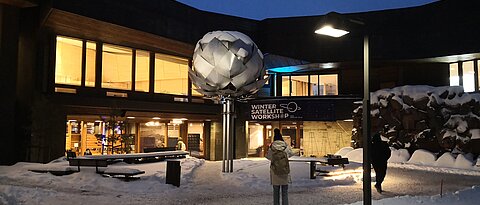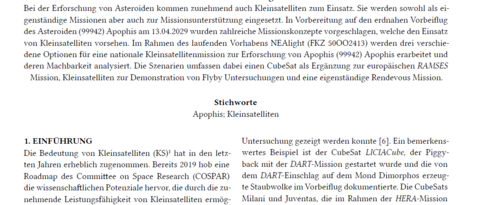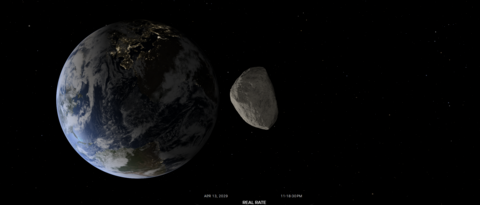
The current status of the Apophis Interceptor Mission was presented at the annual Winter Satellite Workshop in Helsinki.
moreNEAlight is an investigation to analyze the realization possibilities and challenges of small satellite missions for the exploration of near-Earth asteroids (NEA), in particular the asteroid (99942) Apophis. As part of a project extension, the realization of the Apophis Interceptor Mission is being studied.
Project Start: 01.05.2024
End: 30.04.2026
Funding Code: 50OO2413
Contact:
The asteroid (99942) Apophis, which is approximately 340m in size, will fly by the Earth on April 13, 2029 at a distance of only 6 Earth radii (Link: Animation of the flyby). This near-Earth flyby will provide an almost unique opportunity to study an "Sq-type" asteroid in detail with relatively little effort. Furthermore, due to its size and orbit, the asteroid belongs to the group of Potentially Hazardous Asteroids (PHA). A detailed investigation of its physical properties, its internal structure and the influence of the Earth's gravitational force during its flyby offers a unique data set for asteroid research as well as for planetary defense and the development and evaluation of suitable defensive measures.
As part of NEAlight, three potential concepts for a national small satellite mission to the Near-Earth Asteroid (99942) Apophis are being investigated in depth. The concepts are based on the preliminary results of the SATEX study on the use of small satellites in extraterrestrial applications and the experience of the SONATE-2 mission launched in March 2024. The aim of the investigations is to work out the necessary requirements of the mission scenarios and to define the basic mission architecture as well as the realization possibilities. The concepts will also be used to investigate synergies in the design with perspective small satellite missions to other near-Earth asteroids (NEA) and cislunar missions. The investigation will be carried out at the Interdisciplinary Research Center for Extraterrestrial Studies (IFEX) at the Professorship for Space Technology.
The NEAlight project was extended in order to investigate the Apophis Interceptor mission concept within the scope of a Phase A study. The aim of this phase is to evaluate the technical and scientific feasibility of the mission, design initial system architectures and identify critical requirements.
Apophis Interceptor is a concept for a small satellite mission that will take advantage of the unique opportunity to observe the near-Earth asteroid (99942) Apophis at close range during its flyby of Earth in April 2029. Two identical small satellites are to be placed in a highly elliptical Earth orbit for this purpose, from which they can simultaneously capture imagery Apophis from different angles during its close flyby of Earth on April 13, 2029. These images can be used to obtain information about the shape and rotation of the asteroid, as well as the effects of its close approach to Earth.
In addition to observing the asteroid, the concept also envisages measuring the Earth's radiation and magnetic field environment during the mission lifetime of about one year. The project thus contributes to both asteroid research and the characterization of near-Earth space.

The current status of the Apophis Interceptor Mission was presented at the annual Winter Satellite Workshop in Helsinki.
more
The NEAlight project has received a 12-month extension to develop the Apophis Interceptor concept within the scope of a Phase A study.
more
The Apophis Interceptor Mission concept, developed within the framework of the NEAlight project, was presented at the Apophis T-4 Workshop.
more
A contribution from the NEAlight project was submitted to this year's German Aerospace Congress (DLRK) and has now been officially published on the DGLR publication platform.
more
In five years' time, a large asteroid will fly very close to Earth – a unique opportunity to study it. Concepts for a national German small satellite mission are being examined at the University of Würzburg.
moreA selection of press releases on the project
08.07.2024 - DLR blog post about German concepts for the exploration of Apophis
10.05.2024 - Article on space.com about Apophis and NEAlight
09.05.2024 - Report on small satellites for the exploration of Aophis on SpaceDaily
08.05.2024 - BR article about NEAlight
08.05.2024 - Press release of the University of Würzburg